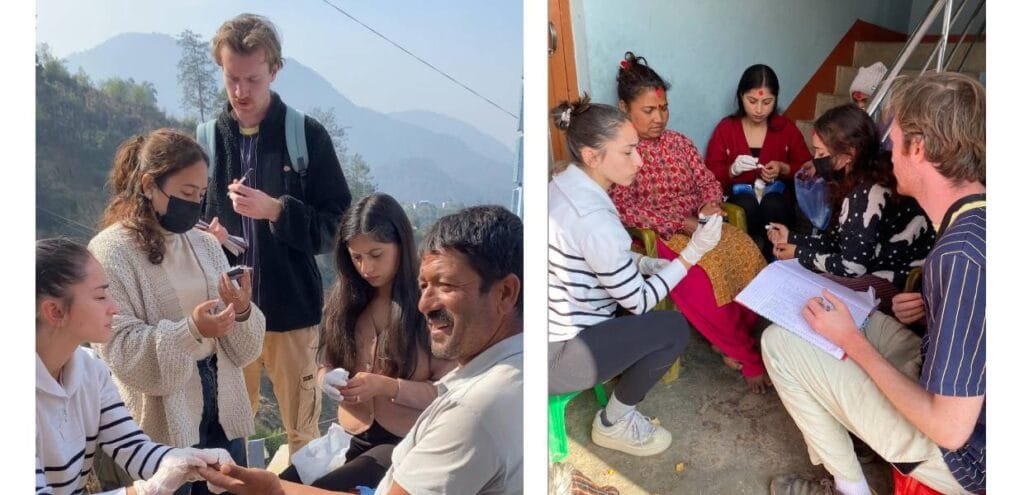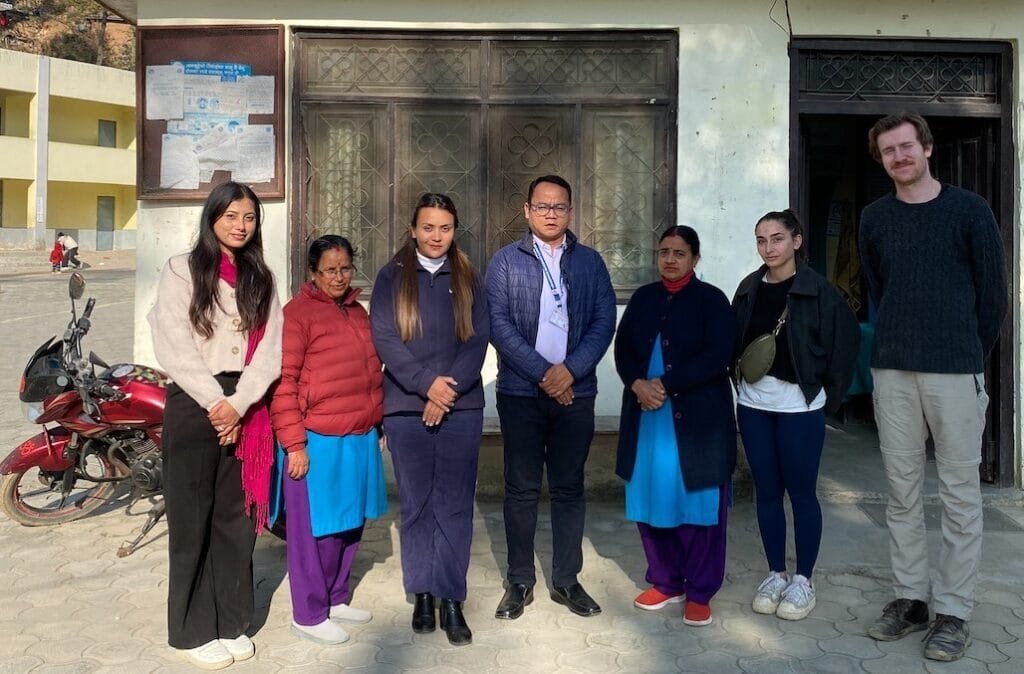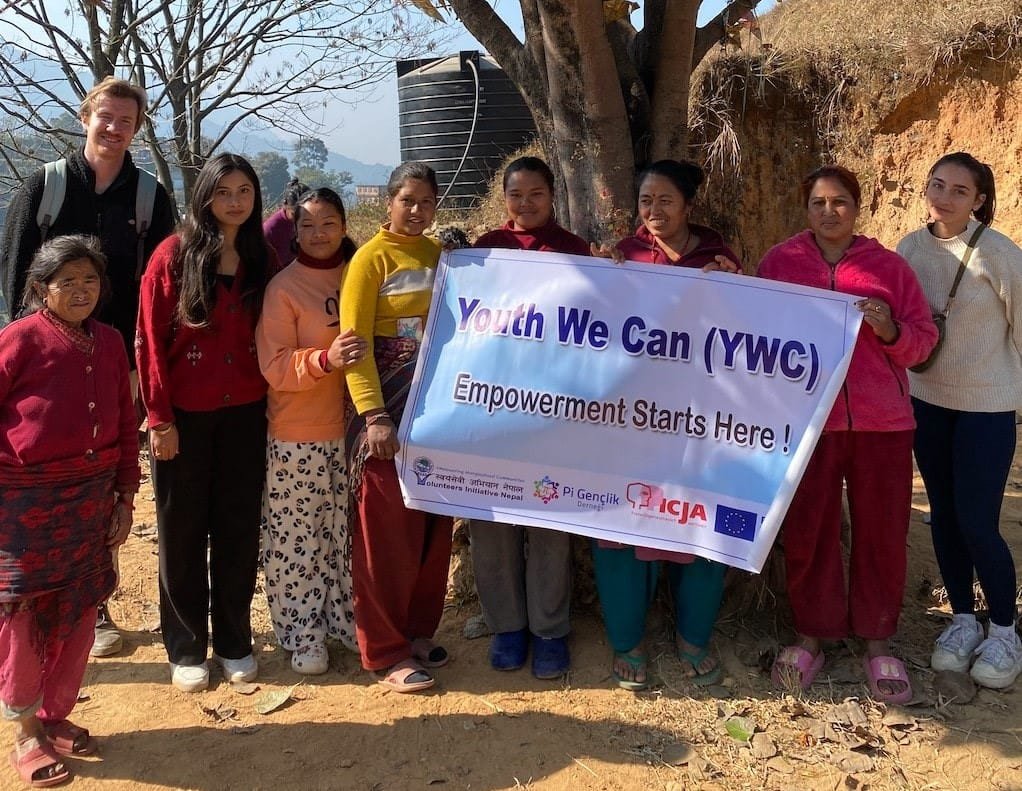TARAKESHWAR, NEPAL – January 31, 2025
Empowering Local Communities Through Public Health Awareness
A dedicated team of YWC ESC HumAid public health volunteers has successfully conducted a series of health education and awareness programs in JitpurPhedi, a rural community in Kathmandu. Led by Harry, Alicia and Kanchan Pokhrel, the Public Health Project Nepal has made a significant impact by organizing workshops focused on menopause and diabetes awareness, implementing health education programs in schools, and promoting local healthcare collaborations. These initiatives have directly benefited over 200 community members and students, highlighting the importance of health systems in Nepal.
Public Health Volunteer Initiatives in Nepal
Menopause Awareness Workshops: Addressing a Critical Gap in Women’s Health
In line with their commitment to public health research, the volunteers conducted menopause education workshops in Khadawalkot Basic School and Nagarjuna Thulagaun Secondary Schools. The sessions offered vital information on symptoms, hormonal changes, health risks, and coping strategies. Many women, particularly in these rural areas, had limited knowledge about menopause, which made the initiative incredibly impactful.
Diabetes Awareness and Blood Sugar Testing: A Step Towards Preventive Healthcare
Diabetes is a growing concern in Nepal, and the healthcare volunteering team has taken proactive measures to tackle it by organizing diabetes awareness sessions in eight different communities: Aryal Gau, Nayagau, Dadagau, Balami Gau, Lamichhane Gau, Panchmane, Bhubaneshwori, and Nayabasti. These workshops addressed the types of diabetes, symptoms, health risks, and lifestyle changes.
Additionally, volunteers conducted on-the-spot blood sugar testing for all participants, gathering critical public health data for municipal health monitoring. These screenings benefited 126 individuals and helped identify potential health risks early.
Strengthening Health Systems in Nepal Through School Programs
 School Workshop Planning: A Holistic Approach to Health Education
School Workshop Planning: A Holistic Approach to Health Education
Understanding the need for structured public health education, volunteers developed a comprehensive school health curriculum for implementation in February and March. The curriculum focuses on:
- Environmental Health
- Nutrition and dietary awareness
- Mental health and stress management
- Menstrual health education
- Substance abuse prevention (smoking, drug, and alcohol awareness)
- Physical activity promotion
This initiative targets students in grades 6, 7, and 9, while grades 8 and 10 were excluded due to their Board Examinations.
Workshops Conducted in Saraswoti and Jitpur Schools
Volunteers also carried out oral health and physical activity workshops in Saraswoti School, benefiting 14 students. Meanwhile, Jitpur School students participated in physical activity (52 students) and nutrition education (28 students). These interactive sessions aimed to instill healthy habits from an early age.
Local Healthcare Collaborations: Strengthening Public Health Systems in Nepal
To expand their impact, volunteers engaged with local health posts to discuss joint health awareness initiatives. These partnerships will enhance public health service delivery in the coming months.
Challenges and Strategic Solutions in Public Health Initiatives
 Despite its successes, the Public Health Project Nepal faced several challenges:
Despite its successes, the Public Health Project Nepal faced several challenges:
1. Difficulty in Engaging Community Members
Many women’s groups were difficult to contact due to their schedules. Solution: Volunteers coordinated sessions to align with pre-existing community gatherings, ensuring higher participation rates.
2. Inaccurate Blood Sugar Testing Due to Non-Fasting Participants
Accurate diabetes screening requires fasting, but many participants arrived having recently eaten. Solution: The team proceeded with testing while noting dietary status to account for any inconsistencies in the data.
3. Limited School Availability Due to Exams and Holidays
With schools occupied by examinations, student engagement was limited. Solution: Volunteers focused on workshop planning for the upcoming months rather than forcing sessions during a busy period.
Key Lessons from Public Health Research in Nepal
1. Strong Community Interest in Healthcare Volunteering Initiatives
Community members displayed enthusiasm and willingness to participate in health education programs, highlighting the need for ongoing public health interventions.
2. High Prevalence of Blood Sugar Irregularities
Initial findings suggest that many individuals in rural Nepal have high or low blood sugar levels, emphasizing the need for continuous screening and preventive healthcare measures.
Future Plans: Expanding Healthcare Volunteer Opportunities in Nepal
1. Launching the School Health Education Program
In February and March, structured health workshops will be conducted across multiple schools, covering crucial global health and personal well-being topics.
2. Publishing a Public Health Research Report
Findings from the diabetes screening and awareness campaigns will be compiled into a report, providing valuable insights for local health authorities and policymakers.
3. Expanding Community Health Workshops
Future sessions will cover environmental health, hypertension awareness, and physical activity promotion, with a potential early launch of a mental health awareness campaign.
Recommendations for Sustainable Public Health Initiatives in Nepal
Regular Blood Sugar Testing: A Long-term Health Strategy
Continued blood sugar screenings can help community members track their health progress while assisting local municipalities in assessing healthcare improvements over time.
Strengthening Health Volunteer Engagement
More healthcare volunteer opportunities should be created to increase outreach and awareness and ensure long-term community engagement in public health initiatives.
Enhancing Healthcare Systems Through Local Partnerships
Collaboration with health posts, schools, and local organizations will strengthen Nepal’s public health system.
How Do I Become a Healthcare Volunteer?
If you are passionate about global health and want to contribute to health care systems in Nepal, consider joining a public health volunteer program. Opportunities are available for individuals interested in health education, preventive care, and community-based healthcare initiatives.
Conclusion: A Commitment to Public Health and Community Well-being
The Public Health Project Nepal continues to demonstrate the power of health volunteers to drive meaningful change. By addressing key health concerns, providing education, and strengthening local healthcare systems, these initiatives are critical to improving the quality of life in Nepal’s rural communities.
With continued community support, research, and volunteer involvement, Nepal is taking significant steps toward a healthier, more informed society.


 Member of
Member of